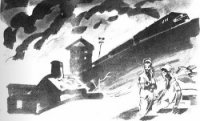Go Set a Watchman - Lee Harper (книги без регистрации полные версии TXT) 📗
PART III
6
“JEAN LOUISE, JEAN Louise, wake up!”
Alexandra’s voice penetrated her unconsciousness, and she struggled to meet the morning. She opened her eyes and saw Alexandra standing over her. “Wh—” she said.
“Jean Louise, what do you mean—what do you and Henry Clinton mean—by going swimming last night naked?”
Jean Louise sat up in bed. “Hnh?”
“I said, what do you and Henry Clinton mean by going swimming in the river last night naked? It’s all over Maycomb this morning.”
Jean Louise put her head on her knees and tried to wake up. “Who told you that, Aunty?”
“Mary Webster called at the crack of dawn. Said you two were seen stark in the middle of the river last night at one o’clock!”
“Anybody with eyes that good was up to no good.” Jean Louise shrugged her shoulders. “Well, Aunty, I suppose I’ve got to marry Hank now, haven’t I?”
“I—I don’t know what to think of you, Jean Louise. Your father will die, simply die, when he finds out. You’d better tell him before he finds out on the street corner.”
Atticus was standing in the door with his hands in his pockets. “Good morning,” he said. “What’ll kill me?”
Alexandra said, “I’m not going to tell him, Jean Louise. It’s up to you.”
Jean Louise silently signaled her father; her message was received and understood. Atticus looked grave. “What’s the matter?” he said.
“Mary Webster was on the blower. Her advance agents saw Hank and me swimming in the middle of the river last night with no clothes on.”
“H’rm,” said Atticus. He touched his glasses. “I hope you weren’t doing the backstroke.”
“Atticus!” said Alexandra.
“Sorry, Zandra,” said Atticus. “Is that true, Jean Louise?”
“Partly. Have I disgraced us beyond repair?”
“We might survive it.”
Alexandra sat down on the bed. “Then it is true,” she said. “Jean Louise, I don’t know what you were doing at the Landing last night in the first place—”
“—but you do know. Mary Webster told you everything, Aunty. Didn’t she tell you what happened afterwards? Throw me my negligee, please sir.”
Atticus threw her pajama bottoms at her. She put them on beneath the sheet, kicked the sheet back, and stretched her legs.
“Jean Louise—” said Alexandra, and stopped. Atticus was holding up a rough-dried cotton dress. He put it on the bed and went to the chair. He picked up a rough-dried half slip, held it up, and dropped it on top of the dress.
“Quit tormenting your aunt, Jean Louise. These your swimming togs?”
“Yes sir. Reckon we ought to take ’em through town on a pole?”
Alexandra, puzzled, fingered Jean Louise’s garments and said, “But what possessed you to go in with your clothes on?”
When her brother and niece laughed, she said, “It’s not funny at all. Even if you did go in with your clothes on, Maycomb won’t give you credit for it. You might as well have gone in naked. I cannot imagine what put it in your heads to do such a thing.”
“I can’t either,” said Jean Louise. “Besides, if it’s any comfort to you, Aunty, it wasn’t that much fun. We just started teasing each other and I dared Hank and he couldn’t back out, and then I couldn’t back out, and the next thing you know we were in the water.”
Alexandra was not impressed: “At your ages, Jean Louise, such conduct is most unbecoming.”
Jean Louise sighed and got out of bed. “Well, I’m sorry,” she said. “Is there any coffee?”
“There’s a potful waiting for you.”
Jean Louise joined her father in the kitchen. She went to the stove, poured herself a cup of coffee, and sat down at the table. “How can you drink ice-cold milk for breakfast?”
Atticus gulped. “Tastes better than coffee.”
“Calpurnia used to say, when Jem and I’d beg her for coffee, that it’d turn us black like her. Are you worn with me?”
Atticus snorted. “Of course not. But I can think of several more interesting things to do in the middle of the night than pull a trick like that. You’d better get ready for Sunday School.”
ALEXANDRA’S SUNDAY CORSET was even more formidable than her everyday ones. She stood in the door of Jean Louise’s room enarmored, hatted, gloved, perfumed, and ready.
Sunday was Alexandra’s day: in the moments before and after Sunday School she and fifteen other Methodist ladies sat together in the church auditorium and conducted a symposium Jean Louise called “The News of the Week in Review.” Jean Louise regretted that she had deprived her aunt of her Sabbath pleasure; today Alexandra would be on the defensive, but Jean Louise was confident that Alexandra could wage a defensive war with little less tactical genius than her forward thrusts, that she would emerge and listen to the sermon with her niece’s reputation intact.
“Jean Louise, are you ready?”
“Almost,” she answered. She swiped at her mouth with a lipstick, patted down her cowlick, eased her shoulders, and turned. “How do I look?” she said.
“I’ve never seen you completely dressed in your life. Where is your hat?”
“Aunty, you know good and well if I walked in church today with a hat on they’d think somebody was dead.”
The one time she wore a hat was to Jem’s funeral. She didn’t know why she did it, but before the funeral she made Mr. Ginsberg open his store for her and she picked one out and clapped it on her head, fully aware that Jem would have laughed had he been able to see her, but somehow it made her feel better.
Her Uncle Jack was standing on the church steps when they arrived.
Dr. John Hale Finch was no taller than his niece, who was five seven. His father had given him a high-bridged nose, a stern nether lip, and high cheekbones. He looked like his sister Alexandra, but their physical resemblance ended at the neck: Dr. Finch was spare, almost spidery; his sister was of firmer proportions. He was the reason Atticus did not marry until he was forty—when the time came for John Hale Finch to choose a profession, he chose medicine. He chose to study it at a time when cotton was one cent a pound and the Finches had everything but money. Atticus, not yet secure in his profession, spent and borrowed every nickel he could find to put on his brother’s education; in due time it was returned with interest.
Dr. Finch became a bone man, practiced in Nashville, played the stock market with shrewdness, and by the time he was forty-five he had accumulated enough money to retire and devote all his time to his first and abiding love, Victorian literature, a pursuit that in itself earned him the reputation of being Maycomb County’s most learned licensed eccentric.
Dr. Finch had drunk so long and so deep of his heady brew that his being was shot through with curious mannerisms and odd exclamations. He punctuated his speech with little “hah”s and “hum”s and archaic expressions, on top of which his penchant for modern slang teetered precariously. His wit was hatpin sharp; he was absentminded; he was a bachelor but gave the impression of harboring amusing memories; he possessed a yellow cat nineteen years old; he was incomprehensible to most of Maycomb County because his conversation was colored with subtle allusions to Victorian obscurities.
He gave strangers the idea that he was a borderline case, but those who were tuned to his wavelength knew Dr. Finch to be of a mind so sound, especially when it came to market manipulation, that his friends often risked lengthy lectures on the poetry of Mackworth Praed to seek his advice. From long and close association (in her solitary teens Dr. Finch had tried to make a scholar of her) Jean Louise had developed enough understanding of his subjects to follow him most of the time, and she reveled in his conversation. When he did not have her in silent hysterics, she was bewitched by his bear-trap memory and vast restless mind.




